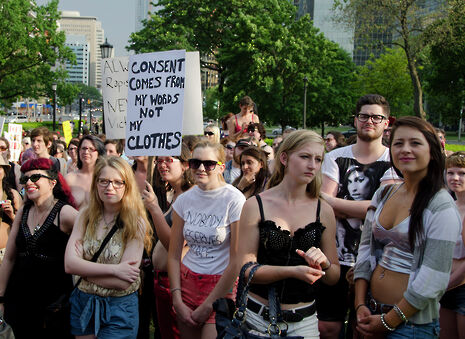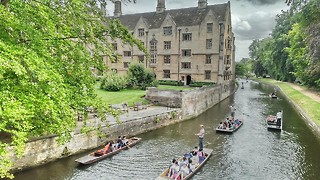A question of judgement
Chris Page argues that the importance of consent workshops cannot be understated in helping people to make their own decisions

Alka Sehgal Cuthbert's article argues that consent workshops conflate complex issues of individual choice and social norms into "pre-formed options from a smorgasboard of moralistic postures". However, this statement reveals a fundamental misunderstanding of the nature of the proposed workshops and the sourrounding issues.
A bit of background. Earlier this term, Varsity and the CUSU Womens' campaign ran a joint survey on sexual assault, harassment and rape in Cambridge. The survey came back with over 2000 responses and the shocking and sobering statistic that 88 per cent of sexual assaults at Cambridge go unreported. In addition to this, the Cambridge Speaks Its Mind project has shared several anonymous testimonies relating to rape and sexual violence among the student body. In other words, the issue of consent has been on the cards this year, and for good reason.
The story then broke that the University was taking the matter seriously and that it was considering proposals for compulsory consent workshops for all incoming students. Note the 'considering' – nothing's been decided on yet, but having worked with the University and seen how easily they sweep things under the carpet, that Cambridge is actually taking the issue seriously enough to be giving it thought heartens me.
The criticisms of consent workshops seem to come from those who've never been to one. They seem to envisage that a consent workshop involves separating the men from the women, and then, presumably, telling the latter that must never have sex ever, and then browbeating into the former that they are all rapists, so don't have sex either, making the whole scene sound like it's run by the gym coach from Mean Girls.
I can't say I speak for every variety of consent workshop ever, but I can speak for those run by CUSU, seeing as I have run consent workshops and assisted in running them when I was a sabbatical officer. The reality is different – consent workshops are open discussions, largely focused around myth busting.
In the workshops I used to run, we often began with a series of statements about consent and asked people to work out if they were myths or facts (things like "If a woman is drunk, she is asking for sexual assault," and "If a man is aroused, he has to have sex," or "Rape and sexual assault only affect women").
This may sound a little banal, but I can't emphasise the importance of it enough; through my work in CUSU, and experience as a volunteer at a Rape Crisis centre, I am shocked by the hazy grasp of consent by young people. At the Rape Crisis centre where I worked, we carried out an outreach exercise one weekend, where we asked about 200 or so people in Manchester to agree or disagree with a series of statements. Shockingly, over half of the people we spoke to (most of them students at the University) agreed with the statement "If someone buys me a drink, then they consent to have sex with me." The mind boggles.
The point of a consent workshop is that it empowers people. It helps them to understand that they are in control of their bodies and sex lives. It does not, in any way, set limits on what people can or cannot do. I doubt any consent workshop in the world is going to tell people not to have sex, or engage in particular sex acts. That is entirely up to you as an adult and informed individual. What consent workshops do do is help people to understand that they can, for example, say "no" at any point. It doesn't mean they have to, but that they can do.
Also, I find it problematic that there is a gendered divide in perception when it comes to consent workshops. Men can be sexually abused as well as women (according to one study, 1 in 10 men experience sexual abuse, as opposed to 1 in 5 women) but we cannot ignore the issue. In any case, consent workshops are, for want of a better phrase, "gender neutral" – it's not about man and woman, it’s about being in charge of your body and avoiding abuse. Also, that whole presumption seems to assume that only straight men pose a threat to straight women – which ignores the existence of genderqueers and transgender people.
Now we need to address the thorny issue of lad culture. Does lad culture have an explicit link to rape culture? It's a tricky one; lad culture is often, but not exclusively, based on the sexual objectification of women. To objectify someone is to remove their agency, and turn them into a passive object, which you can do what you like to or with. In a culture where that is the prevailing attitude, then it allows for ignoring consent and thus opens the door to abuse. This does not mean to say if you are a lad you are a rapist.
What I'm suggesting is more that there is a divide between sexual harassment and sexual assault, and that lad culture leans towards the former and sometimes individuals spill into the latter. Many female friends have recounted to me how the main harassment they receive is when they run into a bunch of young men who have been drinking. It just means that there is an aspect of the culture which is dubious. Sadly, we've seen this in action recently - only a few weeks ago, it emerged that members of the Wyverns drinking society were caught on camera chanting about rape in Oxford.
Lad culture also tends to have what Stewart Lee calls the "Top Gear" defence built into it – "it's just a joke, why can't you take a joke?", and so on. There are a number of fascinating studies which suggest disparagement humour can often prop up discriminatory notions, and as such it doesn’t require a huge leap of logic to conclude that in a context where assumed sexual access to women and rape are joked about, such notions would seem less taboo, and more normalised.
I think, however, we need to be careful not to use lad culture as a straw man to pin all sexual violence at Cambridge on. According to Rape Crisis UK, around 90 per cent of rapes are committed by "known men". In the case of male survivors, statistics are sadly fewer and further between (a sign we need to begin a discussion on male rape) but what I could find suggested that, similarly, the abuser is often a person known to the survivor.
In other words, we need to be careful not to fall into a narrative where we either blame an entire subculture, or see rapists and abusers as inhuman monsters. What they do is monstrous, but what they are, often, are the people in our colleges, our friends and, as the campaign report seems to suggest, a worrying number of staff and fellows. Coming to this realisation is sobering, but it is necessary if we need to get to the heart of the problem.
In short, consent workshops don't take away individual choice, they facilitate the making of informed choices. It is not an overreaction to bring lad culture into these workshops – it is a relevant part of the discussion.
 Comment / Anti-trans societies won’t make women safer14 November 2025
Comment / Anti-trans societies won’t make women safer14 November 2025 Features / Beyond the Pitt Club: The Cambridge secret societies you have never heard of16 November 2025
Features / Beyond the Pitt Club: The Cambridge secret societies you have never heard of16 November 2025 News / Controversial women’s society receives over £13,000 in donations14 November 2025
News / Controversial women’s society receives over £13,000 in donations14 November 2025 Fashion / You smell really boring 13 November 2025
Fashion / You smell really boring 13 November 2025 News / A matter of loaf and death17 November 2025
News / A matter of loaf and death17 November 2025








